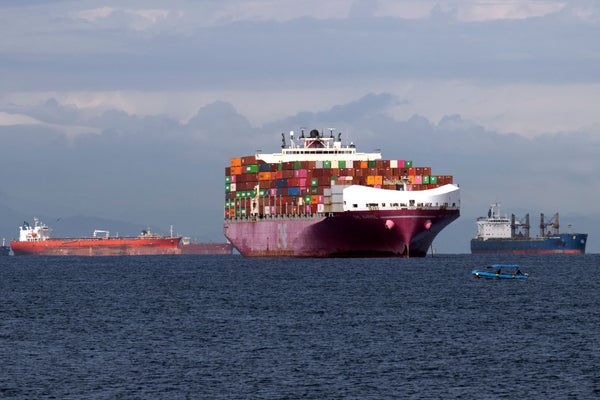August 14, 2024
3 min learn
Cleaned Up Delivery Emissions Have Revealed Extra World Warming
New transport rules set limits on sulfur in maritime gas, lowering dangerous air pollution however inadvertently ceasing a cooling impact on Earth’s local weather

Cargo ships on the entrance of the Panama Canal on September 24, 2023.
Luis Acosta/AFP through Getty Pictures
CLIMATEWIRE | Efforts to chop air air pollution on the excessive seas could have led to an unintended facet impact — dashing up international warming.
That is based on a examine revealed Monday within the scientific journal Geophysical Analysis Letters.
The authors checked out environmental rules, launched in 2020 by the Worldwide Maritime Group, that sought to scale back the quantity of sulfur pumped out by ships worldwide.
On supporting science journalism
For those who’re having fun with this text, contemplate supporting our award-winning journalism by subscribing. By buying a subscription you’re serving to to make sure the way forward for impactful tales concerning the discoveries and concepts shaping our world immediately.
They discovered the principles could have inadvertently raised international temperatures by as a lot as 0.04 diploma Celsius, or about 0.07 diploma Fahrenheit, since 2020 due to the way in which sulfur helps clouds cool the Earth.
The temperature improve estimated by the scientists is about 17 % of the warming brought on by greenhouse fuel emissions over the previous few years, the paper notes. That will make the brand new guidelines a hefty contributor to current rising temperatures — together with the staggering international warmth run of 2023, which went down in historical past because the hottest 12 months on report.
And there’s extra warming coming down the pipeline, the researchers warn.
They counsel that temperatures could rise by one other 0.03 diploma Celsius or extra due to the brand new transport guidelines. Consequently, the brand new rules “will be seen as an inadvertent experiment in photo voltaic geoengineering, however in reverse,” the brand new examine says.
On its face, the idea could sound counterintuitive. Air pollution rules are meant to guard the planet and safeguard human well being. So how might they be nudging international temperatures skyward?
The reply is rooted in physics, scientists say. Sure kinds of air air pollution particles assist clouds type sooner and glow brighter, reflecting daylight away from the Earth and cooling the ambiance within the course of.
Sulfur particles are among the greatest cloud gas round. Additionally they occur to be a significant element of transport air pollution — that’s why ships usually depart vibrant tracks within the air behind them as they transfer via the ocean.
The 2020 IMO rules set new limits for the sulfur content material in ships’ gas in an effort to scale back dangerous air air pollution. However in doing so in addition they eliminated a robust cloud-seeding factor from the ambiance. So with fewer clouds reflecting daylight away from the Earth, international temperatures can rise even sooner.
Which means the environmental rules aren’t heating the planet by themselves — international warming remains to be brought on by human emissions of greenhouse gases. However the brand new guidelines are eradicating a component that helped masks a few of that warming till lately, inflicting temperatures to briefly spike even sooner.
“Cleansing up air high quality sooner than limiting greenhouse fuel emissions could also be accelerating local weather change,” mentioned lead examine writer Andrew Gettelman, a scientist at Pacific Northwest Nationwide Laboratory, in an announcement.
It’s not the primary examine to boost the alarm. Different analysis teams have advised the 2020 rules have had a robust impact on cloud cowl, particularly in elements of the world with heavy ship visitors. These reductions might translate into main good points in international warmth.
A examine revealed in June, as an illustration, advised the brand new transport rules might induce as a lot as 0.16 diploma Celsius of extra warming over the course of simply seven years — successfully doubling the planet’s common warming charge from the final century.
However the actual numbers are up for debate. The June examine projected greater than twice the extra warming implied by the brand new examine. And scientists not concerned with the analysis warned its outcomes may be overstated.
The brand new paper suggests much less warming in response to the transport rules — but it surely additionally acknowledges there’s lots of scientific uncertainty across the figures. Extra analysis is required, knowledgeable by extra knowledge on ship tracks and cloud physics world wide.
Nonetheless, research more and more counsel that air pollution rules can have a considerable influence on the speed of world warming — even when the precise temperature response is up for debate. Which means scientists ought to account for his or her impacts when making projections about future warming, researchers say.
“Because the world quickly decarbonizes and dials down all anthropogenic emissions, sulfur included, it’ll change into more and more vital to know simply what the magnitude of the local weather response might be,” Gettelman mentioned in an announcement. “Some modifications might come fairly shortly.”
Reprinted from E&E Information with permission from POLITICO, LLC. Copyright 2024. E&E Information gives important information for vitality and surroundings professionals.



